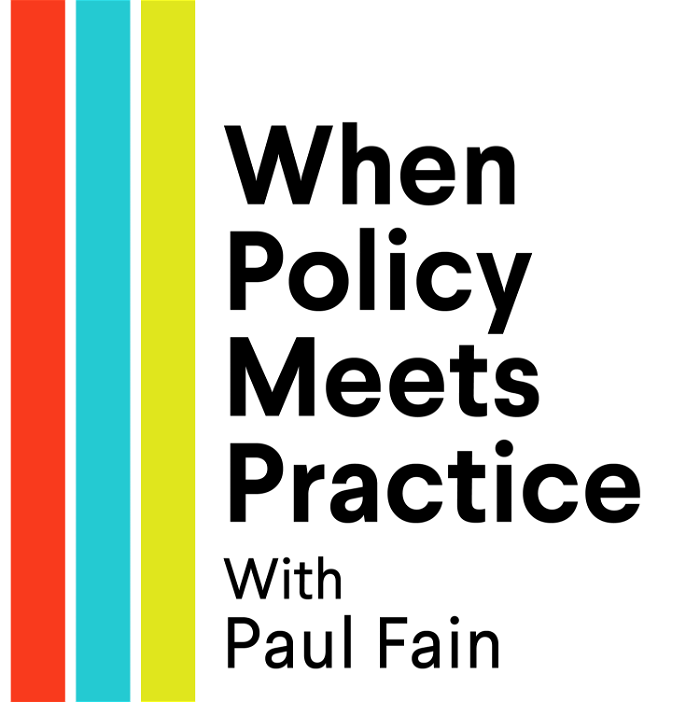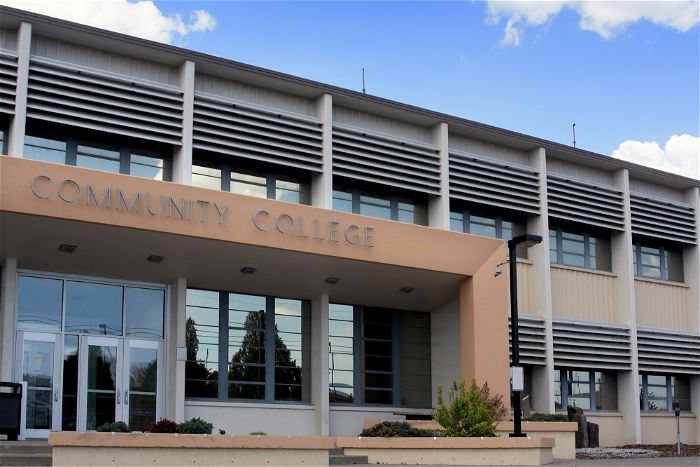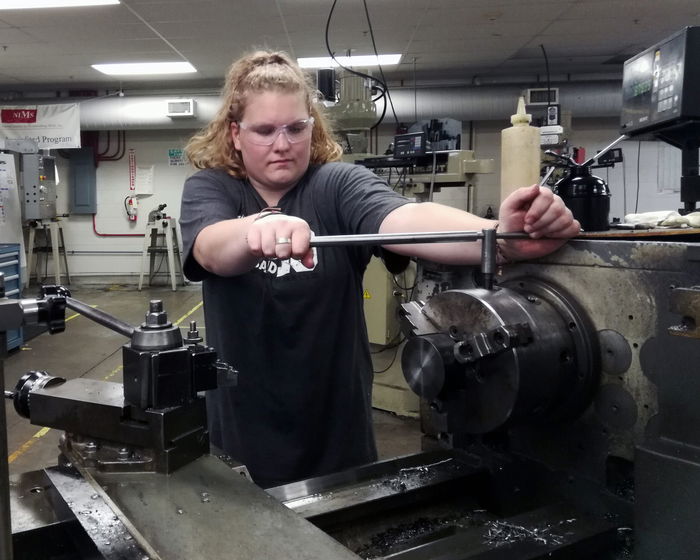
Policy Leadership Trust
May 7, 2018
At a Glance
This select group of education leaders lets experience be their guide in developing state and federal policies that help students attain credentials for greater success in the labor market.
In 2015, JFF established The Policy Leadership Trust to marshal evidence, expertise, and insights of postsecondary practitioners to influence the direction of state and federal policy.
Community college leaders and state system officials serving on the Policy Trust identify key considerations for how policy can help more learners and workers attain credentials and skills and succeed in the labor market.
JFF promotes the Policy Trust positions through
- Strategic outreach to state and federal policy makers and influencers
- Dialog with the field of postsecondary practitioners and stakeholders
- Thought leadership in the media
Podcasts
When Policy Meets Practice, which began June 21st, 2021, is a JFF podcast hosted by longtime higher education journalist Paul Fain. When Policy Meets Practice features conversations with community college leaders who are members of JFF’s Policy Leadership Trust about the policy approaches that produce results for workers, learners, and employers, and those that are falling short.
Blog Series: Practitioner Insights for Equitable Recovery
This monthly blog series provides a practitioner’s perspective on what policymakers and postsecondary education leaders should do to address the multiple pandemics facing our nation and to reimagine a better tomorrow. These blogs, covering a range of topics, are all centered around ways to harness and unleash the full potential of the nation’s public community and technical colleges to better serve families, communities, and regional economies.
Principles
The Policy Trust recommends that federal and state officials keep the following principles in mind when crafting policy solutions:
No Silver Bullets
No single policy intervention will—on its own—move the needle on student success. Good policy takes a multi-pronged approach.
Context Matters
State context matters when designing policy. What is working in one state may not work in another because of differences in political landscape, priorities, governance, capacity, collaboration, and current and past reforms.
Flow from Practice
Policy should flow from practice, not the inverse. In most instances, it is better to use policy as a tool to accelerate implementation and scaling of proven practices that are already taking hold locally—rather than attempt through policy to ignite reforms that have yet to emerge.
Sense of Ownership
Policy is most likely to be implemented with fidelity when practitioners have informed the policy process and have a sense of ownership. Practitioners should have a seat at table when policy is developed.
Incentives
Good policy creates incentives and structure to catalyze change within institutions and among systems.
Respects Autonomy
Good policy respects the autonomy of institutions over academic and student affairs.
Does Not Prescribe Rigid Implementation
Good policy does not prescribe rigid implementation.
Includes High Level Directives
High-level directives can be useful at times in steering the direction of reform, deepening commitment, overcoming resistance and creating leverage.
Publications

Modernizing Career Navigation in the United States
To help all students and jobseekers better navigate the rapidly changing job market and make informed choices about their educational and career paths, the United States must make systemic reforms and strategic investments in career…

How Career and Technical Education Can Provide Today’s Youth With Pathways to College and Career Success
High-quality career and technical education (CTE) programs represent an effective way to provide young adults with an educational experience that prepares them for both college and career success. But not all CTE programs provide accessible…

Realizing the Potential for Rapid Reskilling
Short-term postsecondary credentialing programs represent an effective way for workers and learners of all backgrounds to build the skills they need to enter rewarding careers and achieve financial security in today’s rapidly changing economy. But…

Policy Commitments and Design Principles for Equity and Advancement
Jobs for the Future (JFF) presents these practitioner informed policy design principles for College Promise, Career-Connected Postsecondary programs, and Dual Enrollment to advise state and federal policymakers on what works to increase college and career…

State Policy Paper Series: Strengthening Pathways toward Postsecondary Success
The emphasis in the papers on metrics, money, and systems integration reflects the collective vision of JFF’s Policy Leadership Trust for Student Success on the appropriate role of policy in catalyzing change among systems and…
Meet The Trust

President, LaGuardia Community College

President, Lorain County Community College

President, Cuyahoga Community College

President, Community College of Aurora

Associate Vice President for Academic Affairs, University of Hawaii Community Colleges

President, Community College of Denver

President, Wisconsin Technical College System

President and CEO, Tulsa Community College

President, Northern Virginia Community College

President, Amarillo College

Assistant Superintendent/Vice President, Student Services, Pasadena City College

President, William Rainey Harper College

President, Miami Dade College

President, Forsyth Technical Community College

President and CEO, Calbright College

President, Mohawk Valley Community College

Chancellor, Kentucky Community and Technical College System
Notable Former Members
Scott Ralls (former co-chair), president, Wake Tech Community College; Reynaldo Garcia (former co-chair), president emeritus, Texas Association of Community Colleges; Tristan Denley, deputy commissioner of academic affairs and innovation, Louisiana Board of Regents; Maria Hesse (retired), vice provost for academic partnerships, Arizona State University; Jon Kerr (retired), director, basic education for adults, Washington State Board for Community and Technical Colleges; Ken Klucznick, vice president for academic affairs, Connecticut State Colleges and Universities; Sharon Morrissey, senior vice chancellor for academic and workforce programs, Virginia Community College System; Lawrence Nespoli (retired), president, New Jersey Council of County Colleges; Mary Rittling (retired), president, Davidson County Community College; Monty Sullivan, president, Louisiana Community and Technical College System; Karen Stout, president and CEO, Achieving the Dream; and Tonjua Williams, president, St. Petersburg College.
Related Content

States Need New Ways to Fund Student Success
It’s Time to Talk Dollars and Sense JFF commissioned a white paper to delve into the thorny issue of higher education finance and uncover creative solutions to this perennial problem. The paper, entitled Financing Pathways…

5 Ways Policymakers Can Ensure Quality and Equitable Outcomes for Short-term Training
Expanding short-term postsecondary options can contribute to a strong economic recovery, but bold state and federal policy actions are needed to make sure all learners and workers benefit.

Leadership on the Boundary: Reimagining Success with Innovative Community College Presidents
Leadership on the Boundary: Reimagining Success with Innovative Community College Presidents Three higher education leaders discuss how they are reshaping the role of community colleges as the center of place-based education and workforce transformation. Michael…

When Policy Meets Practice Podcast Series
Series Trailer Paul Fain previews the podcast series, and JFF’s Lexi Barrett explains why policymakers should incorporate the views of on-the-ground practitioners in their policy strategies. Episode 10: Career Navigation Policy and Best Practices for…

JFF PLT members Russell Lowery-Hart and Madeline Pumariega in “Making the Most of $40 Billion”
May 3, 2021
Biden Offers Landmark Plan for Free Community College, but Access Alone Is Not Enough
JFF applauds the Biden administration’s American Families Plan, which calls for two years of free college, yet urges policymakers to craft a program that enables learners of all ages and backgrounds to develop skills that…

Practitioner Insights for Equitable Recovery
America’s community colleges are engines of opportunity that, with the right policies and investments, can help steer us toward an equitable economic recovery. In these white papers, the Policy Leadership Trust explores a series of…

States Must Step Up When Traditional Financial Aid Is Not Enough
The financial worries of today’s community college students reach far beyond tuition. To increase individual success, state policymakers and college leaders must broaden the financial help they offer.

We Need to Repair the Leaking Education Pipeline
By David Altstadt A growing number of high school students takedual-credit courses to get a head start on college. Meanwhile, the goal of the vastmajority of community college students is to transfer to a university…

A Conversation with an Adult Education Director: Ensuring Student Success through Guided Pathways
This is the first in a series of periodic conversations with members of the Policy Leadership Trust for Student Success. Featured in this piece is Jon Kerr, Washington State's director for Basic Education for Adults…

Stackable Credentials Build Ladders to Success
Community college leaders discuss how they became convinced that a focus on non-degree programs, like stackable credentials, is essential for closing equity gaps on their campuses.
















